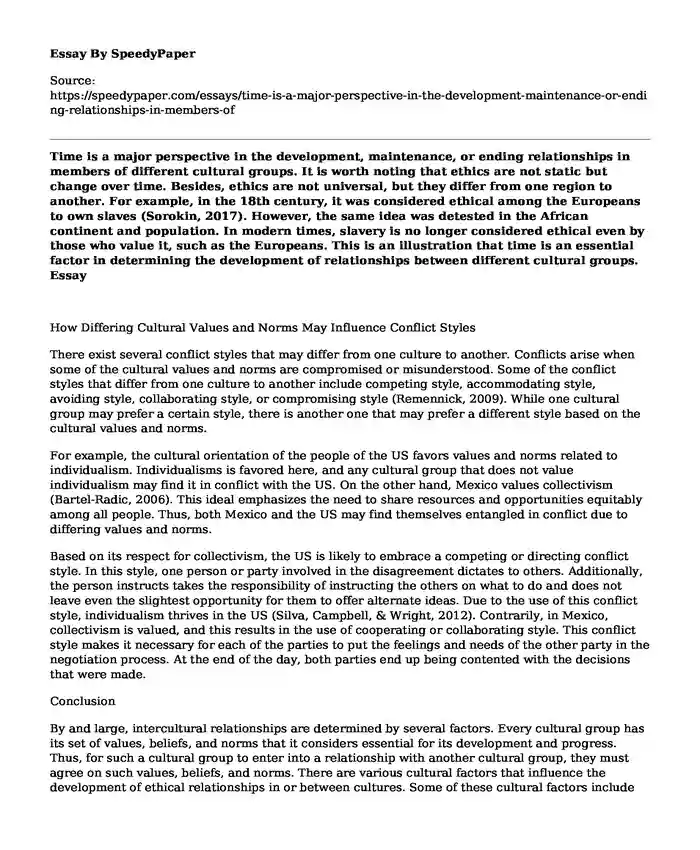
| Type of paper: | Essay |
| Categories: | History Justice Historical & political figures |
| Pages: | 2 |
| Wordcount: | 513 words |
How Differing Cultural Values and Norms May Influence Conflict Styles
There exist several conflict styles that may differ from one culture to another. Conflicts arise when some of the cultural values and norms are compromised or misunderstood. Some of the conflict styles that differ from one culture to another include competing style, accommodating style, avoiding style, collaborating style, or compromising style (Remennick, 2009). While one cultural group may prefer a certain style, there is another one that may prefer a different style based on the cultural values and norms.
For example, the cultural orientation of the people of the US favors values and norms related to individualism. Individualisms is favored here, and any cultural group that does not value individualism may find it in conflict with the US. On the other hand, Mexico values collectivism (Bartel-Radic, 2006). This ideal emphasizes the need to share resources and opportunities equitably among all people. Thus, both Mexico and the US may find themselves entangled in conflict due to differing values and norms.
Based on its respect for collectivism, the US is likely to embrace a competing or directing conflict style. In this style, one person or party involved in the disagreement dictates to others. Additionally, the person instructs takes the responsibility of instructing the others on what to do and does not leave even the slightest opportunity for them to offer alternate ideas. Due to the use of this conflict style, individualism thrives in the US (Silva, Campbell, & Wright, 2012). Contrarily, in Mexico, collectivism is valued, and this results in the use of cooperating or collaborating style. This conflict style makes it necessary for each of the parties to put the feelings and needs of the other party in the negotiation process. At the end of the day, both parties end up being contented with the decisions that were made.
Conclusion
By and large, intercultural relationships are determined by several factors. Every cultural group has its set of values, beliefs, and norms that it considers essential for its development and progress. Thus, for such a cultural group to enter into a relationship with another cultural group, they must agree on such values, beliefs, and norms. There are various cultural factors that influence the development of ethical relationships in or between cultures. Some of these cultural factors include religion, language, and education. In the absence of these factors, it might be difficult to instill these cultural ethical standards.
References
Bartel-Radic, A. (2006). Intercultural Learning in Global Teams. MIR: Management International Review, 46(6), 647-677. Retrieved June 22, 2020, from www.jstor.org/stable/40836111
Dervin, F., & Liddicoat, A. J. (2013). Linguistics for intercultural education. (EBL.) Amsterdam/Philadelphia: John Benjamins Publishing Company.
Remennick, L. (2009). Exploring Intercultural Relationships: A Study of Russian Immigrants Married to Native Israelis. Journal of Comparative Family Studies, 40(5), 719-738. Retrieved June 22, 2020, from www.jstor.org/stable/41604322
Silva, L., Campbell, K., & Wright, D. (2012). Intercultural Relationships: Entry, Adjustment, and Cultural Negotiations. Journal of Comparative Family Studies, 43(6), 857-870. Retrieved June 22, 2020, from www.jstor.org/stable/41756274
Sorokin, P. (2017). Social and Cultural Dynamics: A Study of Change in Major Systems of Art, Truth, Ethics, Law and Social Relationships. Milton: Routledge.
Cite this page
Time is a major perspective in the development, maintenance, or ending relationships in members of different cultural groups. It is worth noting that ethics are not static but change over time. Besides, ethics are not universal, but they differ from one region to another. For example, in the 18th century, it was considered ethical among the Europeans to own slaves (Sorokin, 2017). However, the same idea was detested in the African continent and population. In modern times, slavery is no longer considered ethical even by those who value it, such as the Europeans. This is an illustration that time is an essential factor in determining the development of relationships between different cultural groups.. (2023, Sep 07). Retrieved from https://speedypaper.net/essays/time-is-a-major-perspective-in-the-development-maintenance-or-ending-relationships-in-members-of
Request Removal
If you are the original author of this essay and no longer wish to have it published on the SpeedyPaper website, please click below to request its removal:
- Purpose of Prison - Essay Example in Criminal Justice
- Free Essay on Research Methods in Criminal Justice and Criminology
- Law Essay Example on Restorative Justice
- Free Essay Example on Juveniles Joining Gangs in America
- Free Essay on Rhetorical Strategies in 'Obamacare Is an Unstable Economic Model'
- Essay Sample on Speech Analysis on Martin Luther
- Free Essay: Comparison between President Trump and Andrew Jackson Political Ideology
Popular categories




